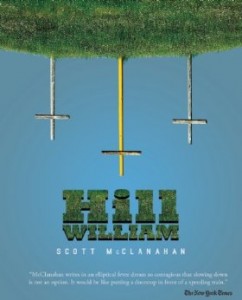HILL WILLIAM by Scott McClanahan
 Hill William
Hill William
by Scott McClanahan
Tyrant Books, November 2013
200 pages / $14.95 Buy from Amazon
Today was a day I skipped lunch for Newcastles. It was 83 degrees outside and I nestled into a lawn chair with Hill William and a shirtdress that had no pants. As soon as I started and the beers grabbed hold I wanted to tell someone about it because EMOTIONS so I thought I would tell Siri. This is what she said back because she is like a parrot. Exactly like a parrot because parrots aren’t exact and can’t get everything right. But luckily there is a cage around them so you can’t hurt them easily.
I’m going to drunkenly live Siri Scott McClanahan’s Hill William
March 24th, 2014 / 11:00 am
Hill William by Scott McClanahan
 Hill William
Hill William
by Scott McClanahan
Tyrant Books, Nov 2013
200 pages / $14 Buy from Amazon
There’s a moment in John Fante’s The Road to Los Angeles wherein his protagonist, Arturo Bandini, has taken all the photographs of beautiful Hollywood starlets he ritualistically masturbates to in the closet into the bathtub with him to drown them, so to speak, and attempt to move on with his life. In a matter of three or four pages it distills the awkwardness and hilarity of growing up into a beautiful, imaginative vision of this young man thrashing around in the tub with photographs surrounding him, their faces beginning to run. Around halfway through Scott McClanahan’s newest work, Hill William, I realized that I’d felt the same sense of awkwardness and hilarity for the past 80 pages, only subsiding briefly when one tale reaches its close, and the next begins.
Fans of McClanahan are well aware of his ability to convey these qualities through a multitude of works. Be it his early collections of Stories, The Collected Works from Lazy Fascist, or the recent Crapalachia, I’m hard pressed to think of any writer working today who so seamlessly blends the horrific with the heartfelt, or small town American mania with the universal notion of comedy, and a desperate search for meaning.
Hill William, for me, feels a bit like the perfect blend of his early short fiction with the all-too-real tales of Crapalachia, while transcending anything thus far and reading like Geronimo Rex-Barry Hannah got into a bareknuckle boxing match with Person-Sam Pink. (This was another comparison that immediately came to mind, if you’ll pardon my digressive tendency.)
Hill William is McClanahan’s first novel, and yet it functions more like a novel-in-stories, the protagonist presenting the reader with any number of characters from his youth like Gay Walter, a “sissified” young man with a pet hamster named Hardees, or Derrick Anger, a boy who introduces young Scott to masturbating via a “1970s’s style dirty book that didn’t even have any pictures in it really but just these drawings of people having sex and these little dirty stories to go along with them.” With each chapter heading comes a new interior landscape wherein the narrator confronts some element of growing up, and yet for all the coming-of-age apparent in Hill William there’s just as much obsession with the surrounding community and the idea of taking on new lives and personalities to pass the time.
Early on, in “Rainelle,” the narrator says “I looked out over the continentals on the street below me and in these houses were people walking around in the lights they just turned on. I sat and felt so lonely because I was only one person and couldn’t be each of them.” This, by itself, got me thinking about McClanahan’s status as a sort of modern day Carver or even Faulkner, in his ability to sit down and narrate quick glimpses into such a wide range of lives. Some of that curiosity about this range of lives explored in his former stories seems to come out again in this urge to embody the whole community while telling one character’s life.
Later, Gay Walter begins singing Alabama’s “Roll On,” when the narrator observes “he was no longer Gay Walter but someone else. He sang and we watched and listened and he was no longer on a porch in the mountains, but he was on a stage somewhere. He was no longer lip synching to the radio, but he was our own private superstar. He was singing our song and we were singing along.” Suddenly the middle of nowhere becomes the center of the universe and it’s due to a mixture of McClanahan’s intimate prose and the unobstructed sight of a child. No longer are we as a reader in the mountains of Appalachia but traveling above it all with a gang of strange perverted nobodies desperate to feel comfortable. The microcosm quickly becomes the microcosm, the particular the general.
December 9th, 2013 / 12:00 pm
